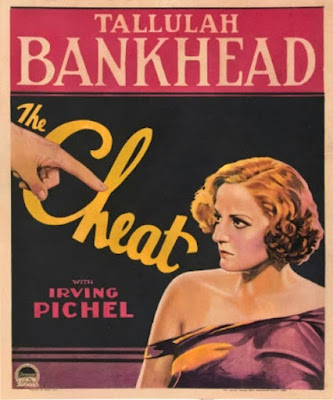Up and coming businessman Jeffrey Carlyle is madly in love with his wife Elsa. Elsa, in turn, is madly in love with Jeffrey. And money. It's a little difficult to see which comes first. Elsa is also a bad gambler, having lost $10,000 in cards at her Long Island country club, thanks to a double-or-nothing bet that never works out in movies.
Elsa's lose way with dough must be a well-kept secret in her circle, since she's put in charge of $14,000 meant to go to the Milk Fund. (And you thought milk was expensive now!) When Elsa gets wind of a stock market opportunity that promises a 100% return in 48 hours, she puts $10,000 of the milk money into it, believing everything will work out by Friday. This dame certainly places misguided faith in double-or-nothing bets.
 |
| Just to let you know, she's the one doing the talking here. |
In return, all Livingstone wants is for Elsa to drop by his house whenever he commands. That debt appears to clear up the following day, when her husband's big business deal comes through, allowing her to repay Livingstone. Mr. Japanese-Wannabe millionaire refuses the check despite Elsa refusing to go through with her end of the bargain. Which one is the cheat here anyway?
 |
| What do you do when you're branded, and you know you're a cheat? |
she's still his property. Not by holding her captive or demanding the return of a cool Japanese dress he lent her for a costume party, but by branding her chest. Talk about a money shot!
It seems anti-climactic to describe the rest of the movie -- Elsa shoots Livingstone in the shoulder; Jeffrey (remember him?) takes the blame, but is let off the hook during the trial when Elsa shows the brand to the courtroom as the reason she pulled the trigger. Nothing tops that branding scene, even if it is done in shadow. Another cheat!
 |
| Elsa realizes going to a costume party with her husband dressed like that was a bad idea. |
Tallulah Bankhead, still a year or so away from starting to look like Tallulah Bankhead, plays Elsa alternately languid and panicked, in love and bored out of her mind, enjoying the good life while trying to escape it. I mean, Tallulah Bankhead connected to the Milk Fund? Only when it's mixed with bourbon. She appears to be a decade older than the milquetoasty Harvey Stephens, playing Jeffrey, yet they're both only 29 years old.
 |
| Livingstone feels the fury of an outraged courtroom. Not so suave now, are you, Mr. Sophisticate? |

No comments:
Post a Comment